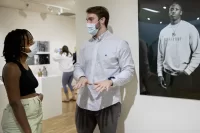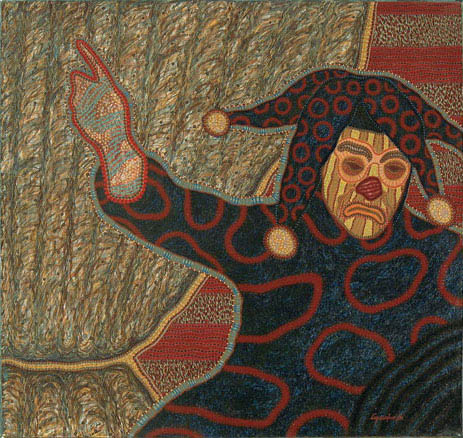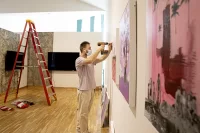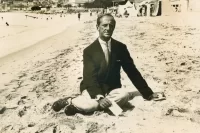
First solo U.S. exhibition by famed Cuban artist presented at Museum of Art
The opening reception for Manuel López Oliva: Cuba and the Theatre of Desire, the first solo U.S. exhibition by one of Cuba’s most famous and accomplished artists, takes place from 7 to 9 p.m. Friday, Sept. 5, at the Museum of Art, located in the college’s Olin Arts Center, 75 Russell St.
The reception includes a lecture by exhibition organizer Lillian Guerra, assistant professor of history at Bates. Her talk is titled Manuel López Oliva and the Special Period in Cuba — referring to Cuba’s tumultuous times during the so-called “Special Period,” the era since the collapse of the Soviet Union, the island nation’s protector and economic mainstay. Guerra also gives gallery talks at 1 p.m. Sept. 6, and 11 a.m. and 1 p.m. Sept. 20.
Marilyn Zeitlin, director and chief curator of the Arizona State University Art Museum, gives a lecture titled News from the Tropical Paradise: Cuban Art Now at 7 p.m. Friday, Sept. 19. The exhibit runs through Oct. 5. The public is invited free of charge to visit the museum.
Dreamlike, even whimsical, López Oliva’s paintings create a world of settings taken from history and literature and peopled by masked, theatrical figures. “The relationship between theater and the act of living is very direct,” the artist told Guerra in 2002.
“Aside from being actors who take on different characters, sometimes merely for effect, sometimes out of desire — the desire for self-expression, for power, for love, for truth — we are also actors in the circumstances of history,” he said.
Paintings by López Oliva are in the permanent collections of museums in Paris, Madrid, Venice and other major cities. Born in 1947 in the port city of Manzanillo and raised amidst an intellectual circle sympathetic to Castro’s revolution, he is not only an artist but a principled writer, critic and champion of the arts with sufficient stature to take stands that sometimes conflict with official policy.
López Oliva is distinguished among Cuban artists particularly by his use of literary and classical allusions, and the mask motif in his paintings is likewise distinctive. At the same time, though, the masks tie him to a movement to fuse visual and theatrical arts that has arisen in response to the dislocations of the Special Period.
At home, Guerra notes, his work is seen as reflecting the reality of Cuban life today — fantastic, self-contradictory, multilayered. “There’s a surreal quality to life in Cuba” since the early 1990s, she says, during which time this avowed atheist, communist state has welcomed the Pope and embraced capitalist economic practices.
“All of a sudden, these things that nobody ever thought were possible have become possible, and it is almost as if you’re living Carnival all of the time,” she says, referring to the Latin American style of celebrating that pre-Lenten holiday with wild festivity, costumes and masks, and exploding “prizes” that can be very nice or quite unpleasant. “You never know what’s going to happen. You never know what’s real.”
Moreover, López Oliva uses the masks as “a symbol of our own conviction that we know who we are, and we are projecting that all the time,” says Guerra. “Behind our projection is something else.”
Guerra, who has known the artist since 1996, worked with the Museum of Art to bring the show to Maine in part because of its value to her course exploring revolution in the Caribbean and Central America. Yet his work, she says, transcends politics or purely Cuban concerns to speak of myth, morality, the charged connections between sex and power, and the search for truth.
“So much of this work is like a window into the soul,” Guerra says. “It’s not just his soul, but it’s the soul of Cubans, and it’s the soul of Americans, and it’s the soul of whoever really takes the time to look.”
One of seven institutions on the Maine Art Museum Trail, the Bates College Museum of Art has significant holdings of work by major artists from Maine and elsewhere and is particularly noted for its collection of pieces by Lewiston native Marsden Hartley. The museum is open 10 a.m.-5 p.m. Monday-Saturday and 1-5 p.m. Sundays. School groups and other tours are welcome. To schedule, please call 207-786-8302; for information, please call 207-786-6158.





